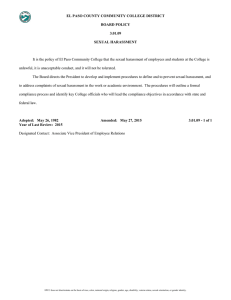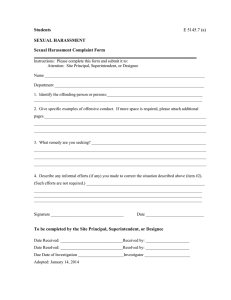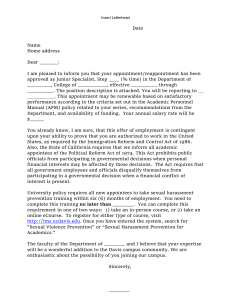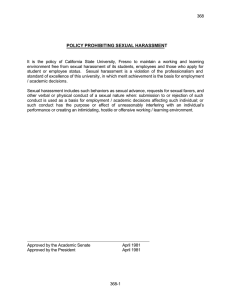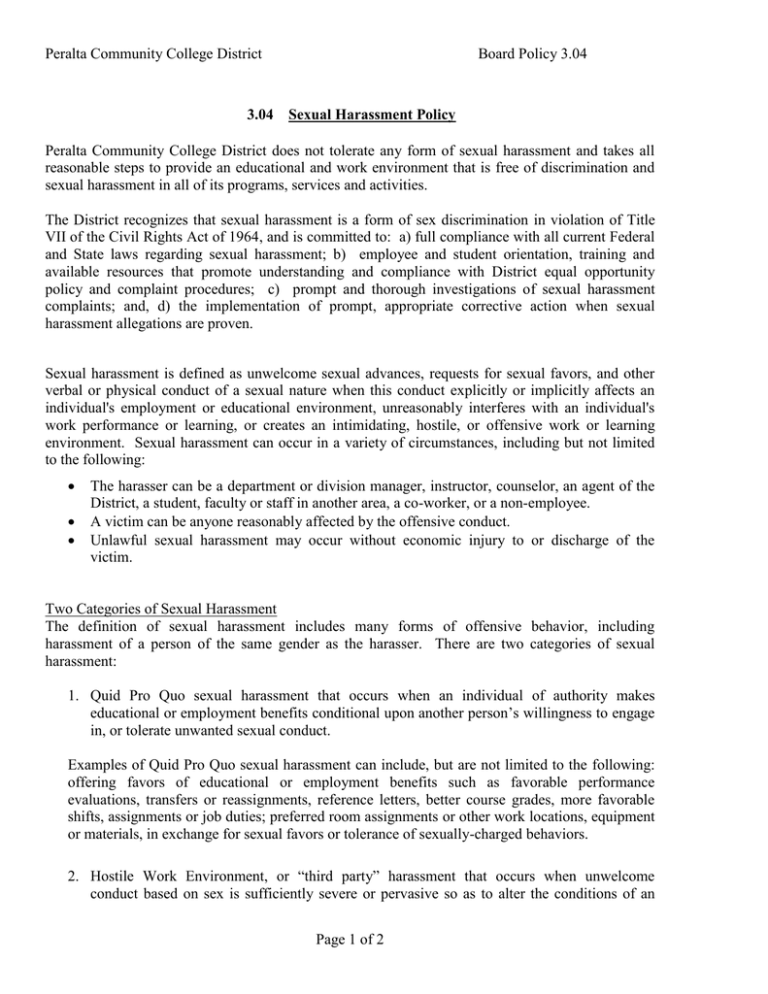
Peralta Community College District
3.04
Board Policy 3.04
Sexual Harassment Policy
Peralta Community College District does not tolerate any form of sexual harassment and takes all
reasonable steps to provide an educational and work environment that is free of discrimination and
sexual harassment in all of its programs, services and activities.
The District recognizes that sexual harassment is a form of sex discrimination in violation of Title
VII of the Civil Rights Act of 1964, and is committed to: a) full compliance with all current Federal
and State laws regarding sexual harassment; b) employee and student orientation, training and
available resources that promote understanding and compliance with District equal opportunity
policy and complaint procedures; c) prompt and thorough investigations of sexual harassment
complaints; and, d) the implementation of prompt, appropriate corrective action when sexual
harassment allegations are proven.
Sexual harassment is defined as unwelcome sexual advances, requests for sexual favors, and other
verbal or physical conduct of a sexual nature when this conduct explicitly or implicitly affects an
individual's employment or educational environment, unreasonably interferes with an individual's
work performance or learning, or creates an intimidating, hostile, or offensive work or learning
environment. Sexual harassment can occur in a variety of circumstances, including but not limited
to the following:
The harasser can be a department or division manager, instructor, counselor, an agent of the
District, a student, faculty or staff in another area, a co-worker, or a non-employee.
A victim can be anyone reasonably affected by the offensive conduct.
Unlawful sexual harassment may occur without economic injury to or discharge of the
victim.
Two Categories of Sexual Harassment
The definition of sexual harassment includes many forms of offensive behavior, including
harassment of a person of the same gender as the harasser. There are two categories of sexual
harassment:
1. Quid Pro Quo sexual harassment that occurs when an individual of authority makes
educational or employment benefits conditional upon another person’s willingness to engage
in, or tolerate unwanted sexual conduct.
Examples of Quid Pro Quo sexual harassment can include, but are not limited to the following:
offering favors of educational or employment benefits such as favorable performance
evaluations, transfers or reassignments, reference letters, better course grades, more favorable
shifts, assignments or job duties; preferred room assignments or other work locations, equipment
or materials, in exchange for sexual favors or tolerance of sexually-charged behaviors.
2. Hostile Work Environment, or “third party” harassment that occurs when unwelcome
conduct based on sex is sufficiently severe or pervasive so as to alter the conditions of an
Page 1 of 2
Peralta Community College District
Board Policy 3.04
individual’s learning or work environment, unreasonably interfere with an individual’s
academic or work performance, or create an intimidating, hostile or abusive work or learning
environment. The victim must subjectively perceive the environment as hostile, and the
harassment must be such that a reasonable person of the same gender would perceive the
environment as hostile.
Examples of Hostile Work Environment sexual harassment can include, but are not limited to the
following: unwanted sexual advances; actual or threatened retaliation; leering; making sexual
gestures or displaying sexually suggestive objects, pictures, cartoons, or posters; making or using
derogatory comments, epithets, slurs, or jokes; sexual comments including graphic comments
about an individual’s body; sexually degrading words used to describe an individual; or
suggestive or obscene letters, notes, or invitations; physical touching or assault, as well as
impeding or blocking movements.
Consensual Relationships
Romantic or sexual relationships between individuals of the opposite or same sex are inappropriate
and strongly discouraged when the individuals involved are faculty/student or
supervisor/subordinate, having evaluative and/or direct supervisory responsibilities over the other,
including responsibilities for grading, counseling, and/or other authority or provision of academic
services, because of the potential conflict of interest.
A consensual relationship may cause an appearance of impropriety; lead to third party charges of
favoritism, and/or negatively impact the productivity and morale of others who observe and must
interact with the two parties in the learning or workplace environments. Such relationships may
change, with the result that sexual conduct once welcome can become unwelcome and harassing.
Prompt and Thorough Complaint Investigations
Through its designated Equal Opportunity compliance officer, the District will maintain current
procedures for the investigation and resolution of sexual harassment complaints in a fair and
consistent manner. The District considers such complaints as serious matters, and is committed to
their prompt and thorough investigation, pursuant to current District procedures and required
timelines.
Consistent with the legal rights of all parties, timely and appropriate disciplinary action will be taken
against any individual whose behavior is proven to constitute sexual harassment, and the District
will insure that any harm resulting from that harassment will be promptly corrected.
Source of Law:
Revised and Approved by the Board of Trustees: February 26, 2008
Page 2 of 2


